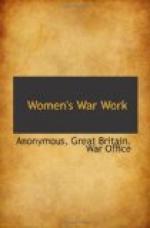The first welders triumphantly passed their tests and gave every satisfaction in the factory, and the training went on and the School was enlarged.
The oxy-acetylene welders turned out by this School have gone all over the country and 220 were trained and placed in the first year. Those selected were, with few exceptions, educated women, which was undoubtedly a material factor in the success of their work. This School opened training to women and welding is now taught to women in many of our Technical Schools. A class in Elementary Engineering has also been carried on by Women’s Service with great success and the women placed in workshops.
The Ministry of Munitions has also arranged, in conjunction with the London County Council and other Educational Authorities, to have free munition training for women at every centre in the Kingdom. The courses vary from six to nine weeks and maintenance grants are paid during the period of training.
In October, 1915, the Central Labour Supply Committee which dealt with women’s and men’s conditions, issued certain recommendations in Circular L.2. These dealt with the conditions and rates of pay of women and fully skilled and unskilled men. The provision of this much-discussed circular that affected women doing skilled work was in Clause 1, which provides that “Women employed on work customarily done by fully skilled tradesmen shall be paid the time rates of the tradesman whose work they undertake.”
These provisions were then only binding on the Government establishments, and could not be enforced by the Ministry of Munitions in controlled establishments. On December 31, 1915, a conference was held between the Prime Minister, the Minister of Munitions and representatives of the Amalgamated Society of Engineers, when an agreement in regard to “dilution” was arranged. Circular L. 2 was adopted at this conference as the basis of the undertaking given by the Ministry in regard to dilution of labor. An employer under it can be punished as contravening the Munitions Act if he fails to carry out the direction of the Minister. The power of enforcing the provisions of L. 2 were acquired in January, 1916, and it is quite obvious that in this circular a principle of the greatest importance to men and women is laid down. Women were wholly averse to being “blacklegs” in industry.
The great work of “Dilution” in Munitions—and by dilution we mean the use in industry of unskilled, semi-skilled and woman labor, so that highly skilled men may not be used except for the most important work—is done by the Dilution Department of the Ministry of Munitions, which issues Dilution of Labour Bulletins and Process Sheets periodically, showing the work women are doing. A series of exhibitions of women’s work have also been arranged by the Technical Section of the Labour Supply Department in all the big towns in England. In Sheffield over 16,000 people came to see the Exhibition—the largest number of these being foremen and workmen sent by their firms.




